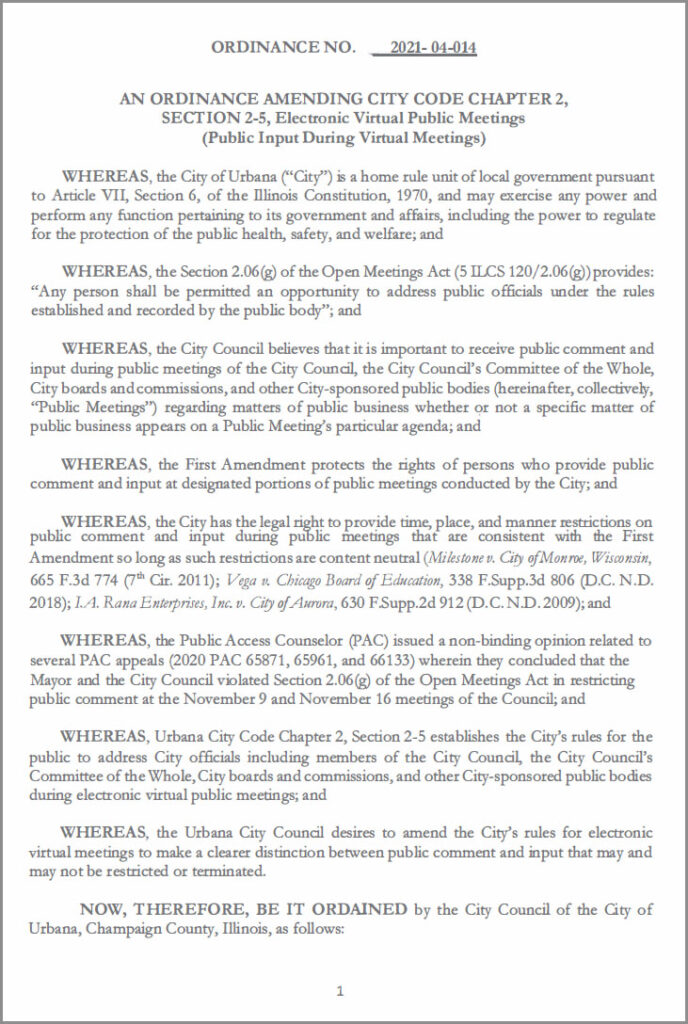The Mayor of Urbana and the Council who helped her promote content-based speech restrictions at public meetings are struggling to cope with a recent Attorney General determination that their meeting rules violate state law. The Council discussed the AG ruling at their April 5th meeting, but the exchange fell far short of honest and forthcoming.
The Council discussion can be seen here:
Mayor Diane Marlin, who first pushed her speech restrictions on September 14th and famously interrupted and/or muted more than a dozen members of the public, refused to discuss or comment on the AG’s determination at all. Council members who issued comment largely made effort to distract the public from what had really happened at numerous public meetings in late 2020.
Ward 5 Alderman Dennis Roberts, who said that “this was a useful experience”, questioned what types of public input would actually qualify as “disruptive”. The new City Attorney, David Wesner, suggested that a “string of vulgarities where somebody is yelling” might qualify, but he did not seem certain that a sufficient disruption was even possible when the speaker was not physically present at the meeting, as has been the case for Urbana’s virtual meetings for more than a year. In any case, no instances of vulgarity were ever observed or cited as a reason for having speech restrictions.
Ward 1 Alderman Maryalice Wu employed a rather bizarre distraction technique. Wu began asking questions about nudity during public meetings, as though obscene or profane language or imagery had anything to do with Urbana’s speech restrictions. Check CU could not find a single instance of this in the past 10 months and it was not cited or considered in any way when the Mayor and the Council instituted their new speech restrictions in October. The restrictions focused entirely on the speech content and specifically disallowed criticizing public employees and elected officials. The new speech restrictions were designed specifically for and only for virtual meetings – nudity isn’t even possible since public speakers can only transmit audio and not video.
Wu also said that she voted for the speech restrictions thinking that muting people would not be the course of action taken at meetings. This is a confusing claim since the September 14th test-run began with Mayor Marlin muting multiple people and then Wu voted in favor of the speech restrictions on October 12th. The new rules specifically state that speakers who stray into critical commentary would be muted by the chair.
Wu noted that the mutings stopped after November, but did not mention that the Council’s change in behavior precisely coincided with the filing of an Open Meetings Act lawsuit on November 20th which specifically cited the speech restrictions.
Ward 7 Alderman Jared Miller, the only Council member to vote against the speech restrictions, appeared to be the only member of the City Council who desired an honest conversation on the issue. Miller warned the Mayor and the Council multiple times in September and October about the speech restrictions. Mayor Marlin, along with City Attorney James Simon, insisted that their scheme was lawful. Even Ward 4 Alderman Bill Brown, who is an ACLU representative, was in favor of the speech restrictions.
On October 21st, Check CU issued a lengthy analysis of the legal claims put forth by City Attorney James Simon. The analysis shows that Simon’s claims exhibited gross incompetence – many of his legal citations actually demonstrate the opposite of what Simons sought to prove. On October 22nd, the same analysis was sent to Mayor Marlin and the City Council along with a letter urging the Council to remove their content-based speech restrictions, but no one responded or took any action.
Dennis Roberts said that the speech restrictions were necessary because many members of the public were angry about the beating and arrest of Aleyah Lewis in April of 2020. Describing members of the public who were muted as “angry” directly conflicts with the findings of Assistant Attorney General Grace Angelos, who said that residents who were interrupted and eventually muted were speaking in a “calm manner”. Angelos went further and described how residents remained calm even after being interrupted and scolded by Mayor Marlin, who claimed that people were not allowed to criticize elected officials.
The Council did not discuss the issue of City Administrator Carol Mitten retaliating against the members of the public who sought a stop to Urbana’s illegal speech restrictions. Mitten published the home address and email addresses of two members of the public requested the Illinois Attorney General review, and refused to redact it until one of the victims complained to the City Council multiple times over a period of four days. Last year, City Attorney James Simon warned that he would sue the City if they released his home address, so Mitten’s actions seem blatantly contrary to the general posture of the City regarding private information.
At the conclusion of their nineteen minute discussion, the Urbana City Council Committee of the Whole decided to amend their meeting rules to indicate that members of the public should not be interrupted for content-based reasons. The change strikes the “abusive, harassing, threatening, or defamatory language” verbiage which was being used to broadly censor any opinion that the City disliked.
It is not clear that the change truly secures the right of the public to disagree with their officials. The rules still allow the chair to interrupt and mute someone if they think the speaker’s comments “disrupt” or “disturb” the “orderly progress of business”. City Attorney James Simon had previously argued that criticisms of public officials do in fact damage the “decorum” of a meeting, so it would stand to reason that the speech restrictions may still be invoked unlawfully even after the ordinance change. Having issued no apology to the victims and having given virtually no acknowledgement to the fact that the City had committed the violations, there is little reason to think that minor changes in the text of the rules will actually effect a meaningful change in the posture of the City and the officials that lead it.
The proposed ordinance to later Section 2-5 of the City Code will be voted on at the April 12th City Council meeting and can be seen below (click for full 4-page PDF):

